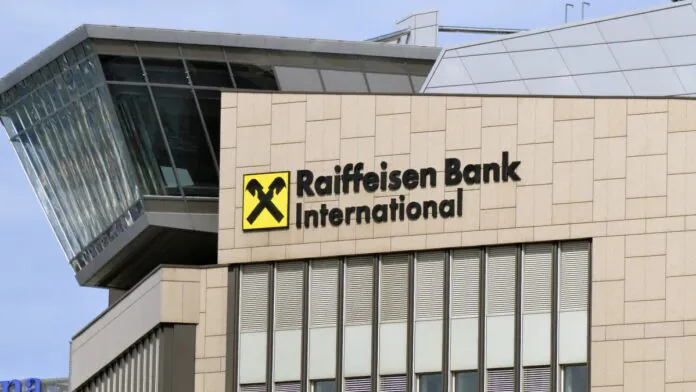© ROOT-NATION.com - Use of content is permitted with a backlink.
The Western banks operating in Russia paid more than €800 million, or more than $857 million, in taxes to the Kremlin last year, four times more than before the war, despite promises to scale back their Russian operations after a full-scale invasion of Ukraine in 2022, reports The Financial Times.
These gains were partly generated by funds that banks cannot withdraw from Russia due to regulatory restrictions introduced in 2022 that prohibit the payment of dividends by Russian subsidiaries to companies from “unfriendly” Western countries.

Higher interest rates, with Russia’s central bank’s key rate now at 16%, nearly double the pre-invasion level, have also boosted banks’ income from floating-rate loans and accumulated additional income from funds held in Russian deposit accounts.
The seven largest European lenders with Russian assets – International, UniCredit, ING, Commerzbank, Deutsche Bank, Intesa Sanpaolo and OTP – reported a combined profit of more than €3 billion in 2023, three times more than in 2021.
“We cannot do anything with Russian deposits except keep them in the central bank. So, with the increase in interest rates, our profits have also increased,” a top manager of a European bank with a Russian subsidiary told the FT.
Exit from Russia is complicated by blocked cash and the requirement of personal permission of the President of Russia for the sale of banking operations. Of the 45 Western banks that needed permission, only seven received it, including Mercedes-Benz Bank and Intesa, writes the FT.
The Kremlin’s profits and tax revenues have soared in part because international sanctions have cut off most Russian banks from the SWIFT payment system, making the remaining international banks key financial conduits between Moscow and the West, thereby increasing their commission income.
A Financial Times analysis shows that the sharp rise in profitability has led to European banks paying around €800m in taxes, up from €200m in 2021. It also came amid rising earnings at US lenders such as Citigroup and JPMorgan.
_
More than half of the €800 million in tax payments goes to the Austrian Raiffeisen Bank, which has the largest presence in Russia among foreign creditors. Raiffeisen Bank’s profits in Russia have more than tripled to €1.8 billion between 2021 and 2023, accounting for half of the Austrian group’s total profits, compared with about a third before the war. In addition to regular tax deductions, Raiffeisen Bank paid €47 million as a result of a surprise levy the Kremlin imposed on some companies last year.
Despite a promise to reduce the scope of its activities in Russia after Moscow’s full-scale invasion of Ukraine in 2022 and constant criticism from the European Central Bank and the US Treasury Department for delay, Raiffeisen Bank has reduced its Russian loan portfolio by 56% since the beginning of 2022, writes the FT. However, recent job postings at Raiffeisen Bank in Russia, as previously reported by the Financial Times, hint at plans to significantly expand its client base.
Austria previously supported the 12th package of EU sanctions against Russia only after Ukraine removed Raiffeisen Bank from a symbolic blacklist of “international war sponsors” aimed at putting pressure on companies doing business in Russia.
Representatives of Deutsche Bank, Hungary’s OTP and Commerzbank told the FT that they had significantly reduced their already small presence in Russia compared to Raiffasen. Italy’s Intesa is the closest to an exit, although it has yet to sell its Russian business, while UniCredit declined to comment.
In 2023, Ukraine listed Hungary’s OTP Bank as an international war sponsor for its activities in Russia and Russian-occupied territories but was forced to remove it after Hungary threatened to block military support and EU sanctions.

While U.S. lenders such as Citigroup and JPMorgan also paid taxes on their shrunken Russian units last year, global banks’ combined revenues, profits and taxes have declined since 2022, but remain much higher than before the invasion.
Despite closing its corporate and retail sectors, the US-based Citigroup earned $149 million and paid $53 million in taxes in Russia in 2023, making it the fourth-largest Western taxpayer, according to data from the Kyiv School of Economics. JPMorgan said it earned $35 million and paid $6.8 million in taxes.
Read also:
- The Pentagon can’t force SpaceX to block Starlink for the Russians
- The GUR disclosed the details of the damage to the large Russian amphibious ship “Yamal”


